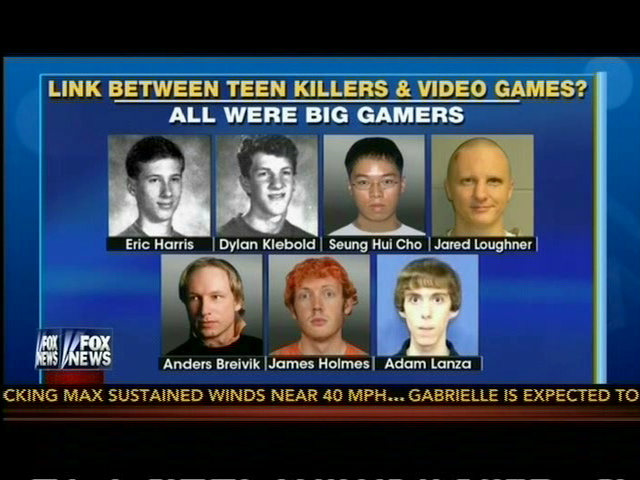Fox & Friends host Gretchen Carlson and Fox News contributor Keith Ablow distorted research findings to warn of a “terrifying link” between video games and mass shootings while dismissing the role of high powered firearms in those incidents.
During the September 10 edition of Fox & Friends, Carlson claimed, “brand new research suggests there is a terrifying link between video games and violent behavior,” before showing images of recent mass shooters who purportedly “were big gamers.” Ablow -- claiming that all of the shooters were “addicted to violent video games” -- said that a recent study that found “watching violent video games increases aggression and decreases empathy” to support his claim that video games are linked to mass shootings.
Carlson concluded the segment by saying, “This whole is issue is so much more complicated than just gun control, there are so many other factors, mental illness [and] video games are just two of them”:
In fact, the author of the research cited by Carlson and Ablow -- which was actually published in 2010 -- has stated that video games cannot be the sole cause of mass shooting incidents, despite being a proponent of the claim that a relationship exists between video games and real world violence. Ohio State University professor Brad Bushman published the survey of other studies that found a link between playing video games and aggressive thoughts cited by Ablow during his Fox & Friends appearance.
However, in explaining his research on video games in a March 20 New York Daily News op-ed, Bushman wrote, “It is crucial to understand there is no single cause of a crime like [Sandy Hook shooter Adam] Lanza's, and no responsible scholar could claim that violent video games cause murder.”
Furthermore, other research disputes the link between violent video games and real world violence.
For example, a 2013 study in the Journal of Aggression, Maltreatment & Trauma found a host of environmental influencers on violence, but concluded, “Media use was not associated with either increased or decreased risk of adult criminality.” In a report summarizing research on violent video games, First Amendment watchdog group Media Coalition claimed that research establishing a link between violent video games and real world violence is flawed (emphasis original):
Research into the effects of video games on aggression is contested and inconclusive. Much of it suffers from methodological deficiencies and provides insufficient data to prove a causal relationship.
- Reviews by the governments of Australia, Great Britain and Sweden have all studied the research claiming a link between violent video games and aggressive behavior and concluded that it is flawed, flimsy and inconclusive.
- In striking down a California law aimed at restricting the sale of violent video games, the U.S. Supreme Court in 2011 noted that the scientific evidence the state relied upon had been rejected by nearly every court to consider it, and that “most of the studies suffer from significant, admitted flaws in methodology.”
- Critics of these flawed studies have also noted a bias against publishing studies that find what scientists call “null effects”--that is, the experimental conditions they construct (e.g., “video games cause violent behavior”) yield no measurable reactions, least of all those hypothesized at the start.
MIT professor Henry Jenkins made similar points in an essay for PBS that noted an overwhelming majority of teenage males play video games and that “most studies” purporting to establish a link to real world violence “found a correlation, not a causal relationship, which means the research could simply show that aggressive people like aggressive entertainment.”
According to The Washington Post's Max Fisher, “Looking at the world's 10 largest video game markets yields no evident, statistical correlation between video game consumption and gun-related killings.” In fact, Fisher found, if anything, a correlation exists between higher consumption of video games and lower rates of gun homicide.
Carlson and Ablow also ignored that research on mass shootings demonstrates a disproportionate use of assault weapons and high-capacity magazines, leading to higher death tolls.
Of the mass shooters that Fox mentioned to highlight video game use, all employed either an assault weapon, high-capacity magazine, or both during their shooting rampages:

- Columbine shooters Eric Harris and Dylan Klebold used, among other guns, a Hi-Point Carbine rifle and TEC-DC9 assault pistol. Klebold also carried 52-, 32- and 28-round magazines.
- Virginia Tech shooter Seung Hui Cho fired 174 rounds from 10- and 15-round magazines.
- Tucson shooter Jared Loughner used a handgun equipped with a 33-round magazine to kill six people and wound 13 others, including Congresswoman Gabrielle Giffords, in just 16 seconds.
- Norwegian shooter Anders Breivik used a Ruger Mini-14 assault weapon and 30-round magazines to kill 67 people.
- Aurora movie theater shooter James Holmes used, among other guns, a Smith & Wesson M&P15 assault weapon and 100-round magazine drum to kill 12 and wound scores more.
- Sandy Hook shooter Adam Lanza used a Bushmaster assault rifle and 30-round magazines to kill 20 children and six adults.
According to a Mother Jones study of the 143 weapons used in 62 mass shootings between 1982 and 2012, 48 would have been outlawed by a Senate proposal to ban assault weapons and high-capacity magazines:
Shootings that involve an assault weapon, high-capacity magazine, or both also produce more injuries and fatalities. An analysis of mass shootings that occurred between January 2009 and January 2013 by Mayors Against Illegal Guns found that “Assault weapons or high-capacity magazines were used in at least 13 of the [56] incidents (23%). These incidents resulted in an average of 14.8 total people shot - 135% more people shot than in other incidents (6.8) -- and 8.0 deaths -- 57% more deaths than in other incidents (5.1).”

